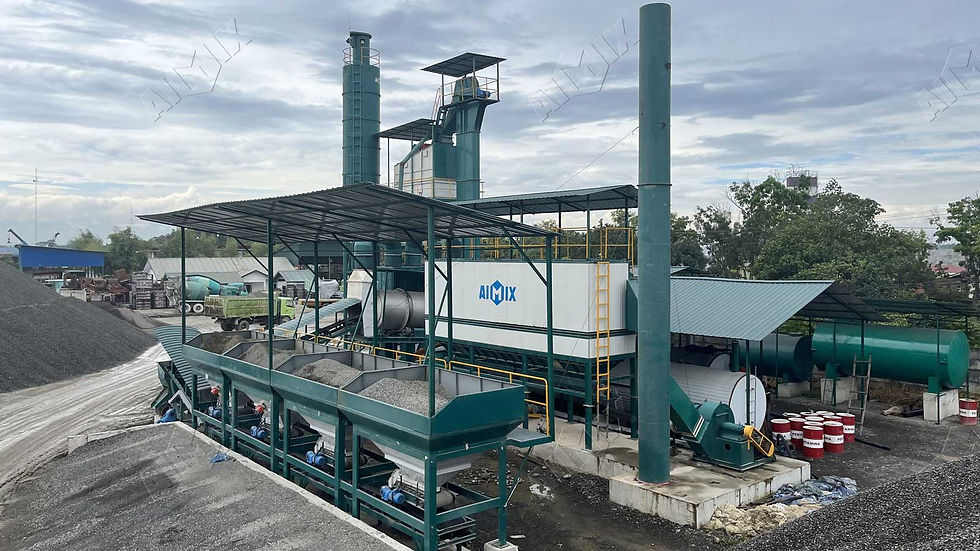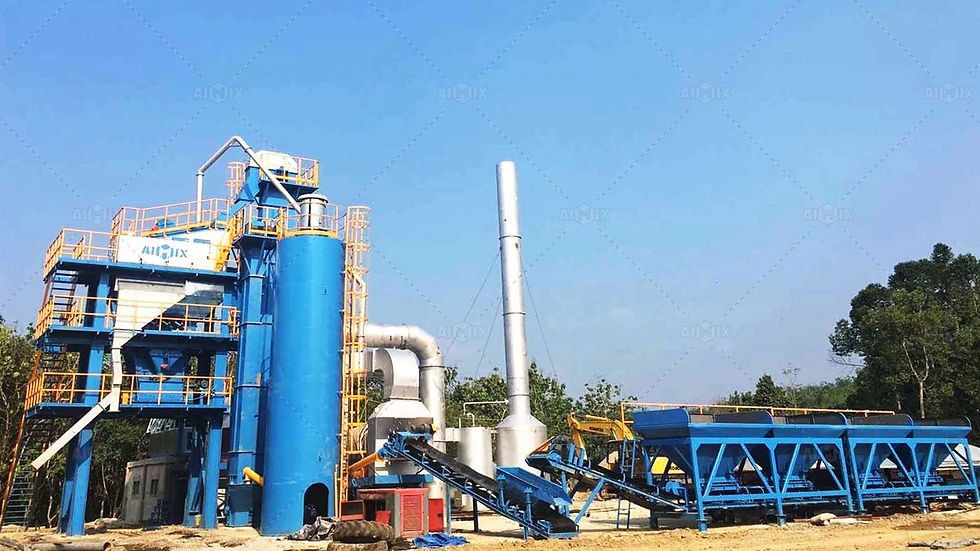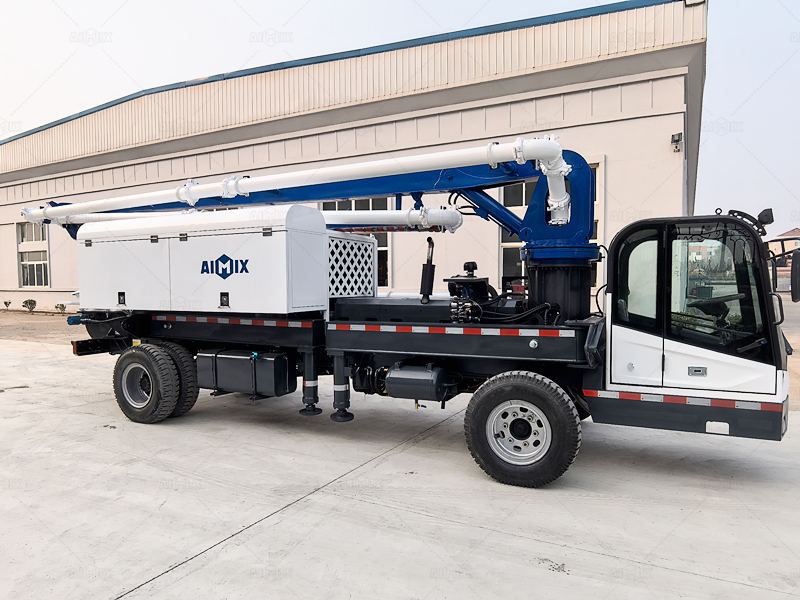Is 80 TPH Asphalt Batch Plant Sufficient for Rural Road Development (15 km) in South Africa?
- aimixglobal5
- Oct 22, 2025
- 4 min read
When planning a rural road project in South Africa, one of the first questions contractors often ask is: “Is an 80 TPH asphalt batch plant enough for my 15 km road construction?” The answer depends on several factors, including road design standards, paving thickness, daily production targets, and project timeline. Let’s explore how an 80 TPH asphalt batch plant for sale performs in this scenario and whether it truly fits the needs of rural road construction.

Understanding the 80 TPH Asphalt Batch Plant
An 80 TPH (tons per hour) asphalt plant for sale is designed to produce 80 tons of hot mix asphalt per hour under ideal working conditions. It’s a mid-range capacity, often used for small to medium-sized projects. Compared with larger plants (120–160 TPH), it offers lower investment, faster setup, and more flexible operation, especially when project volumes are moderate.
However, whether it’s sufficient depends on how much asphalt the project requires and how quickly it needs to be delivered to the paving site.
Estimating Asphalt Demand for a 15 km Rural Road
To evaluate suitability, let’s make a simple estimation. Suppose the road width is 6 meters and the asphalt layer thickness is 5 cm (0.05 m). The total asphalt volume can be calculated as:
15,000 m × 6 m × 0.05 m = 4,500 m³
Since asphalt density is around 2.4 tons/m³, the total asphalt needed is roughly 10,800 tons. If the project aims to finish paving in 30 working days, the daily asphalt requirement would be around 360 tons per day.
At a continuous rate of 80 TPH, the plant can produce 640 tons in an 8-hour shift — enough to meet daily needs with a comfortable margin. This calculation clearly shows that for a 15 km rural road, an 80 TPH batch plant can easily handle the workload if production and logistics are well coordinated.

Practical Benefits for Rural Road Development
In rural areas, road construction conditions are often more challenging. Transport distances are longer, electricity supply can be unstable, and site accessibility may be limited. Here, an 80 TPH asphalt mixing plant South Africa offers distinct advantages.
1. Easier Transportation and Installation
Smaller asphalt batch plants are easier to transport to remote locations. They can be installed on compact sites and relocated when the project moves to a new section. This mobility reduces downtime and logistics costs compared with large stationary plants.
2. Energy Efficiency and Lower Operating Cost
Fuel consumption is a major concern for rural projects. An 80 TPH plant consumes less fuel while maintaining sufficient output for moderate-scale work. It helps contractors control production costs and achieve higher efficiency without sacrificing quality.
3. Consistent Mix Quality
Even though the capacity is moderate, batch plants provide precise control of mixing time and temperature. This ensures consistent asphalt quality — a critical factor for road durability, especially under varying rural weather conditions.

When an 80 TPH Plant May Be Insufficient
Although it suits most 10–20 km rural roads, an 80 TPH asphalt batch plant may not be enough if the project involves thicker asphalt layers, dual carriageways, or compressed deadlines. For instance, if the same 15 km road requires two asphalt layers (base and surface), total asphalt demand would double. In that case, a 120 TPH or 160 TPH plant would be more practical to avoid delays.
Additionally, if the contractor plans to serve multiple projects simultaneously, upgrading to a higher capacity plant can increase flexibility and long-term returns.
Tips for Maximizing Efficiency on Site
Even with an 80 TPH plant, efficiency largely depends on planning. To make the most of your plant, ensure the following:
Position the plant close to the paving site to minimize truck cycle time.
Use insulated asphalt trucks to prevent temperature loss during transport.
Maintain stable production scheduling to avoid downtime or material waste.
Monitor burner efficiency and dust collection system to optimize fuel and environmental performance.
When properly managed, an 80 TPH asphalt batch plant can deliver consistent daily output and help complete rural roads efficiently and economically.

Why I Recommend the 80 TPH Asphalt Batch Plant for Rural Projects
Based on real-world experience, I’ve found that this plant capacity strikes an ideal balance between investment, mobility, and performance. It’s strong enough to meet daily asphalt requirements for 15 km rural road projects in South Africa while remaining flexible for future work in nearby areas. For contractors expanding from small municipal works to regional infrastructure, the 80 TPH batch plant provides a reliable starting point.
Conclusion: Make Your Project More Efficient
So, is an 80 TPH asphalt batch plant sufficient for rural road development in South Africa? Yes — in most cases, it offers the right capacity, manageable costs, and dependable performance for 10–20 km projects. However, the final choice should match your actual road design, daily targets, and project timeline.
If you’re planning a rural road construction project and need a reliable asphalt mixing solution, I can help you find the right configuration. Whether you require an 80 TPH batch plant or a higher capacity model, I can recommend a bitumen mixing plant that matches your specific project scale and site conditions. Feel free to contact me for tailored advice and a detailed quotation.




Comments